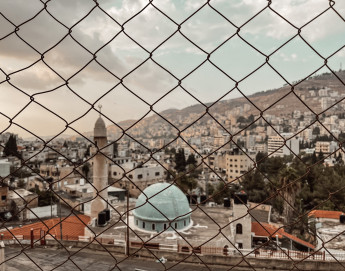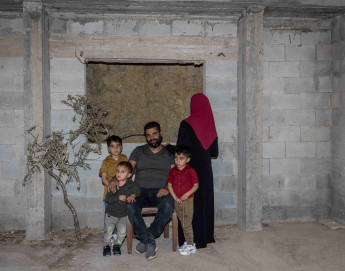What does the law say about the responsibilities of the Occupying Power in the occupied Palestinian territory?

The official name of the Delegation is "ICRC's Delegation in Israel and the Occupied Territories". The "occupied territories" referred to comprise the West Bank including East Jerusalem, the Gaza Strip, the Golan Heights and the Shebaa Farms. The ICRC sometimes uses the term "occupied Palestinian territory" to refer to the West Bank, including East Jerusalem, and/or Gaza specifically. This use is based on the standardization of the term, adopted by the United Nations after the recognition of the right to self-determination of the Palestinian people.
The occupation
A territory is considered occupied when it is placed under the authority of a hostile army. In the aftermath of the 1967 international armed conflict between Israel and its neighbouring states, the Israeli armed forces started to exercise their authority over new territories and populations. Thus, the ICRC considers those territories as being under Israeli belligerent occupation, affirming the de jure applicability of the law of occupation (Hague Regulations of 1907 and the Fourth Geneva Convention of 1949).
Israel's own Supreme Court relies largely on the law of belligerent occupation in its jurisprudence. As to the State of Israel, it accepts the de jure applicability of the Hague Regulations and the de facto applicability of GCIV, which constitute the main instruments of the law of occupation.
General principles of the law of occupation
Though the laws of occupation are contained in various IHL instruments and sources, occupation law rules generally share the same reasoning, which is based upon four basic and general principles:
First, the occupation law rules reflect the principle that an Occupying Power does not acquire sovereign rights to the occupied territory. It therefore may not effect changes in the status and intrinsic characteristics of the occupied territory.
Second, occupation law rules reflect the principle that occupation is a temporary situation. In this regard, the Occupying Power must maintain the status quo ante and must not adopt policies or measures that would introduce or result in permanent changes, in particular in the social, economic and demographic sphere. As a result, the rights and duties set forth in occupation law of the Occupying Power are also temporary – they are limited to the duration of the occupation. These rules essentially require the Occupying Power, during the temporary period of the occupation, to maintain as normal a life as possible in the occupied territory and to administrate the territory for the benefit of the local population, while taking into account its own security needs.
Third, the rules of occupation law that govern the exercise of powers by the Occupying Power, always require it to take into account, and balance, two interests: its own military needs and, simultaneously, the needs of the local population. This balance should be reflected by the Occupying Power in the way it administers an occupied territory and more generally in all the actions it takes and the policies it implements in that territory. Importantly, while this balance may sometimes be decided in favour of the security needs of the Occupying Power, the rules of the law of occupation never allow the Occupying Power to completely discount the needs of the local population in the actions it takes.
Fourth, it can generally be said of the rules of the law of occupation that they do not allow the Occupying Power to exercise its authority in order to further its own interests (other than its military interests), or with a view to using the inhabitants, the resources, or other assets of the territory it occupies for the benefit of its own territory or population.
These four general principles should be considered in relation to all matters which are occupation law related, and they underpin the main provisions of this body of law.
Settlements and Settlement Expansion
The ICRC's official position is that the West Bank has been occupied by Israel since 1967. Consequently, the ICRC has repeatedly stated that Israel settlements' policy goes against key provisions of International Humanitarian Law (IHL), specifically the law of occupation, and is contrary to its intent and spirit. The 1949 Fourth Geneva Convention (GCIV) prohibits an Occupying Power from transferring its own population into the territories under its occupation. Therefore, Israel's settlements policy in the West Bank contradicts the Fourth Geneva Convention. Settlement expansion – be it through formal expansion of existing settlements or through the largely unchecked spread of unauthorized outposts – is the key source of legal and humanitarian concerns in the West Bank. With its decades-long presence in the occupied Palestinian territory, the ICRC has been a witness to settlements' impact. They restrict Palestinians' freedom of movement and affect the social and economic fabric of entire communities. They can limit Palestinians' access to their agricultural lands, natural resources or medical services. They also contribute to violence between Israeli settlers and Palestinian communities.
The destruction of private property by an Occupying Power
In general, the destruction of private property by an Occupying Power is prohibited except under certain circumstances. This includes when it is absolutely necessary for military operations, or when dictated by planning policies, which should be to the benefit of the occupied population.
The ICRC discusses instances of property destruction on a case-by-case and confidential basis. IHL requires that an Occupying Power administers the occupied territory in a manner that allows for the natural growth of its communities. Palestinians should be allowed to build on their own land. The ICRC also does what it can to assist the population under occupation when needed. For example, together with the Palestinian Red Crescent Society (PRCS), it provides emergency relief to people whose homes are demolished.
Use of Force
The use of force during law enforcement operations must be assessed, each time, on an individual basis. It must respect the legal standards of necessity, proportionality and precautions to avoid loss in human lives and prevent a further escalation of violence. Lethal force can only be used as a last resort and only when there is an imminent threat to life.
Gaza and the occupation
The ICRC considers Gaza to remain occupied territory on the basis that Israel still exercises key elements of authority over the strip, including over its borders (airspace, sea and land – at the exception of the border with Egypt). Even though Israel no longer maintains a permanent presence inside the Gaza Strip, it continues to be bound by certain obligations under the law of occupation that are commensurate with the degree to which it exercises control over it.
In that regard, IHL requires Israel to ensure, to the fullest extent of the means available to it, that the basic needs of the population of Gaza are met. Notably, it must ensure that Gaza is supplied with the food, medical supplies and other basic goods needed to allow the population to live under adequate material conditions (Article 55 GCIV).
As an occupying power, Israel is entitled to take measures of control and security (Art. 27 GC IV) towards protected persons. In this regard, while Israel is entitled to impose restrictions on the flow of certain goods into Gaza for legitimate security reasons, its unconditional obligation of humane treatment towards the population of Gaza requires that it respects the principle of proportionality in all circumstances. The nature and extent of the restrictions must be justifiable based on security considerations, and the consequences for the population must be proportionate to the legitimate aim of ensuring Israel's security.
Detention and hunger strike
ICRC delegates have been visiting Palestinian detainees in Israeli detention facilities for over 55 years now. Securing humane treatment and conditions for detainees has been at the forefront of our priorities for decades and will remain so. Detainees and their families routinely tell us that our work is essential and makes a positive difference in their lives. The ICRC also works to maintain family links through the Family Visit Program, which enables Palestinians from the West Bank, including East Jerusalem, and the Gaza Strip to visit their family members detained in Israeli prisons.
The ICRC respects detainees' rights to hunger strike and seeks to ensure that the rights of detainees on hunger strike and their dignity and physical integrity as patients are respected, and that the treatment they receive and the conditions in which they are held are humane and meet international standards. It also reminds the authorities of the importance of family visits. ICRC delegates stay in close contact with families throughout a hunger strike to ensure they are kept updated about their loved ones' situation.



